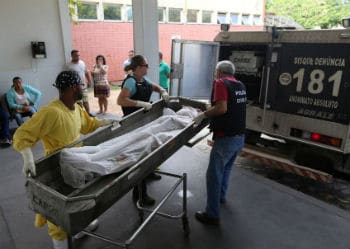A military police strike that began late last week in southern Brazil has led to widespread looting and violence, calling into question just how much responsibility this notoriously lethal unit should have over public security in the country.
Chaos has descended upon the state of Espírito Santo, where military police officers have been protesting to demand higher pay since February 3. Civil police officials say 85 people have died since the protests began late last week, a massive spike for a state that normally averages four homicides per day. Brazil’s Commerce Federation registered 270 stores that have been looted and many others have shut their doors, causing a total loss of over $35 million.
Schools, bus services and health centers will remain closed on February 8 for the third straight day, according to Folha de São Paulo. Acts of violence and theft being carried out in broad daylight by opportunistic criminals have been widely circulated on social media.
In response, President Michel Temer has sent 1,200 members of the armed forces and national guard to secure the state. The governor of Espírito Santo, Paulo Hartung, called the protests “blackmail.”
It is illegal under Brazilian law for the military police to go on strike, but the family members of officers have led the protests by preventing patrol cars from leaving barracks across the state. Some local residents have organized counter-protests to try to convince the police to call off the strike, reported O Globo.
On February 9, Espírito Santo’s civil police force is expected to decide whether it will join the strike, reported O Dia.
InSight Crime Analysis
The current turmoil in Espírito Santo demonstrates how quickly public security can come crashing down in Brazil when the military police are absent. As an editorial by Estadão points out, this is due to an imbalance in power and responsibility between the country’s military and civil police forces.
“After redemocratization, the Brazilian MPs [military police] were greatly strengthened and the Civil Police was weakened,” Estadão writes. “The consequence of this is that the MPs are the principal guarantor of ‘social order.’”
This is a major cause for concern given the extremely violent nature of Brazil’s military police force. In the state of São Paulo alone, military police officers reportedly killed over 10,000 people between 1995 and 2014. A separate report by the Brazilian Forum on Public Security found that military police were responsible for 1,567 deaths nationwide in 2013, almost eight times higher than the 198 cases linked to civil police.
SEE ALSO: Brazil News and Profiles
This has put Brazil in something of a catch-22; authorities need the military police to maintain order, but these officers are extremely violent when they’re patrolling the streets. One potential silver lining of the crisis in Espírito Santo may be that Brazilian officials will finally consider heeding calls to demilitarize the police.
“It’s urgent that Brazil discusses the place that the MPs should occupy in the public security system,” Estadão argues.

